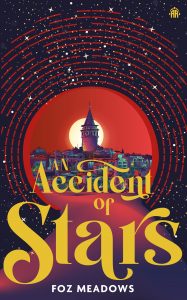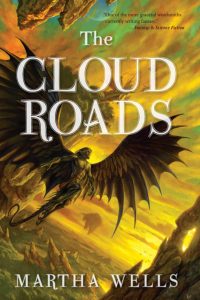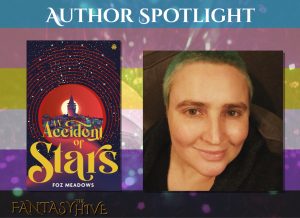Interview with Foz Meadows (AN ACCIDENT OF STARS)
Foz Meadows is a queer Australian author, essayist, reviewer and poet. In 2019, they won the Hugo Award for Best Fan Writer; they have also received the Norma K. Hemming Award in 2018 and the Ditmar Award for Best Fan Writer in 2017. Their essays, reviews, poetry and short fiction have appeared in various venues, including Uncanny Magazine, Apex Magazine, Goblin Fruit, The Huffington Post and Strange Horizons. Foz currently lives in California with their family.
Hi Foz, and welcome to the Hive!
First of all, before we dive into your books, I follow you on TikTok and you need to tell us about your beautiful cats please.
Haha, sure! We have three cats: BB (short for Bumblebee, also known as Bebo) who is a disabled ginger boi; Quango, our big fluffy silver cat, and Juno, a kitten with lynx point Siamese colouring but no actual pedigree. We adopted BB as a kitten in 2018, and as best we can tell, he has mild cerebellar hypoplasia, very underdeveloped rear leg muscles, and a nebulous grasp on catting generally; he’s also quite longsighted. Quango is the eldest; he was four when we found him at the shelter and is now six, and is the most gentlemanly cat I’ve ever met. Juno is the baby – we got her late last year and Quango immediately adopted her as his tiny violent daughter. They all get along very well and bring an enormous amount of joy to our household!
Perfect! <3
Ok, back to the basics. Angry Robot is reissuing An Accident of Stars this month, so what can you tell us about it? Why should readers pick it up if they haven’t already?
An Accident of Stars is a queer, feminist portal fantasy with the safeties off.
Ha!
I wrote it because, growing up, I always loved stories where a character from our world fell through a magic door, but the older I got, the more it bugged me how sanitised those journeys often were. The protagonists would be saviours, greeted as royalty, and there was always a sense of when and how you could go home – that it was a temporary trip, one you’d never have to account for to anyone else. So with An Accident of Stars, I wanted to flip the script: what happens when you find the magic door, but you’re not a princess or a saviour, and the adventure turns out to be genuinely dangerous and complicated? What happens when you know you’re being missed the whole time you’re gone? How much harder do things become then – and how much more meaningful does a new world become, if it’s something you choose for yourself?
Can you tell us a bit more about your characters? Do you have a favourite type of character you enjoy writing?
There are four POV protagonists in An Accident of Stars: Saffron, a teenage girl from Earth who stumbles through a portal she wasn’t meant to see; Gwen, a fiftysomething Earth-born worldwalker who’s been travelling between worlds for decades; Zech, a young girl in Kena with language-magic, called the zuymet; and Viya, the runaway consort of a newly despotic ruler. Based on that, it’s fair to say it’s a very female-centric book, but regardless of gender, I most enjoy writing characters who are figuring themselves out in relation to the world, or who are figuring out the world in relation to themselves. I like that mix of introspection and action that comes from having a character not only be firmly situated in their particular context, whatever it is, but aware of that context and trying to see how it fits together with what’s going on and who they’re trying to be, even if they don’t always get it right.
 Give us a glimpse into the world of your story – is your world building inspired by anything specific?
Give us a glimpse into the world of your story – is your world building inspired by anything specific?
There are two main fictional cultures in An Accident of Stars, though neither is based on any real-world place. One comes from Kena, where the marriages between gods in the heavenly pantheon are reflected in a polyamorous society, so that marrying multiple people for different practical and emotional reasons is the norm; the other comes from Veksh, which is a monotheistic matriarchy ruled by queens and priestesses. I wanted to explore different ways of living and being together as a queernorm backdrop for what the characters are going through, which in turn influences how they think and feel. I also wanted to show that no system or type of person is perfect, but that there’s value in difference and plurality to help us understand what suits us individually; that, even when ideologies come into conflict, it’s not always about one side being right, or anyone being right, for that matter – it’s about understanding where people are coming from, and why.
The new cover is quite different! How involved in the process were you? Was there a particular aesthetic you hoped they’d portray this time?
As much as I love the original cover, I love this one, too! I was originally shown a bunch of different examples and asked which one I preferred, and from there, we narrowed down a few smaller details until we found something that worked. I’m really excited to see it out in the world!
Let’s talk about the writing process; do you have a process? Tell us a little something about how your story comes together.
So, for me, a story usually starts with a pairing of what-ifs. Fairly often, I’ll get the shape of something in my head, like, oh, what if marriage worked like –? or what if there was a person who –?, and then my brain gremlins put it in storage to bounce around with all the other what-ifs, until inevitably, two or more of them fuse together and morph into an idea, at which point a sort of mental static cling causes a few other circling what-ifs to clump on as well and flesh things out. What happens next depends on the idea itself, how much time I have to work on it, the phases of the moon – either I’ll just start writing and see what happens, or I’ll try doing that and realise no, wait, I actually need to work some things out first, or else I’ll tell myself “let’s just jot down some worldbuilding ideas,” and then five hours later I jerk out of a fugue state after writing a thousand year, five thousand word history of a fictional empire to explain the linguistic drift behind how names work in the present. (If this last one sounds like a very specific example, that’s because exactly this happened a few months ago.) Honestly, my brain is a sack of cats, which probably explains why I own three of them.
We see such varying opinions from authors when it comes to the time of editing their books. How have you found the editing process? Enjoyable, stressful or satisfying?
Every edit is different: I always want the book to be the strongest version of itself, but that doesn’t mean the experience of making it so doesn’t vary wildly from project to project. In the case of the rerelease of An Accident of Stars, I was desperate to re-edit the book and feel extremely fortunate to have been able to do so, because when it was originally released, the final document was bricked by a virus that completely screwed the formatting and tracked changes right before it went to print. We were on a tight deadline and everyone involved did their best, but a bunch of errors snuck in regardless, and that’s always gnawed at me. But this time, I got to go back in and fix them!
What (or who) are your most significant fantasy/sci-fi influences? Are there any creators whom you dream of working with someday?
The authors who had the biggest influence on me growing up were Kate Elliott and Katharine Kerr, both of whom I’m lucky enough to have subsequently met and befriended. It wasn’t just that I loved their work and learned a lot from their craft; it was that, even before I was published, when I was a tiny teenage writer on the internet, they interacted with me as a commenter on LiveJournal and a now-defunct website called DeepGenre, where a handful of pro authors gave advice and encouragement to would-be SFF writers. I was this random kid on the other side of the world, and it wasn’t like we spoke all the time, but they were always kind and supportive, and when my first book came out in 2010 and I started to dip my toe in the world of making professional friends and contacts, they remembered me. As for working with other creators, I don’t have any specific names in mind, but I’d love to get the chance to collaborate to make something in a different media format like TV or graphic novels one day!
The world shifts, and you find yourself with an extra day on your hands during which you’re not allowed to write. How do you choose to spend the day?
Well, first I wake up at dawn and do yoga, then I make myself a kale smoothie and – no. Sorry. I’m a horrible gremlin who’ll sleep until noon, slouch downstairs to eat whatever’s easiest to make, and then watch k-pop videos on YouTube until such time as it’s socially acceptable to have an adult beverage, which I will drink while reading in the bath.
Oh thank god, we were worried for a moment there.
Hell, I don’t even put on pants unless I’m leaving the house. I am a creature of simple pleasures and singular braincell.
One of our favourite questions here on the Fantasy Hive: which fantastical creature would you ride into battle and why?
A gryphon, because even though dragons are cool as hell, they’re also sharp and difficult to care for, whereas a gryphon is basically a big flying cat with a beak on and therefore a) more comfortable and b) lower maintenance.
 Tell us about a book you love. Any hidden gems?
Tell us about a book you love. Any hidden gems?
I am always going to stan for the Books of the Raksura series by Martha Wells. If you like queer matriarchal dragon-y shapeshifters with found family, angst, mystery quests and really cool epic worldbuilding, then these are the books for you!
Can you tell us a little something about your current work(s) in progress? Have you any upcoming projects which you can share?
I’ve got an m/m fantasy romance, A Strange and Stubborn Endurance, coming out from Tor in July; I’m currently writing the sequel, which I’m really excited about, and I also have a couple of other projects on the backburner that I’m keen to get to, one of which is about a teenage monster-vet-slash-zoologist doing politics, and the other of which is a sort of reverse murder mystery in a world where magic comes from being touched by gods.
Finally, what is the one thing you hope readers take away from your writing?
I don’t want everyone to take away one specific thing; I just hope that they enjoy it, and that maybe they find something meaningful in it, whatever that means to them.
Thank you so much for joining us today!
An Accident of Stars is out tomorrow – 28th June – from Angry Robot.
You can order your copy HERE

